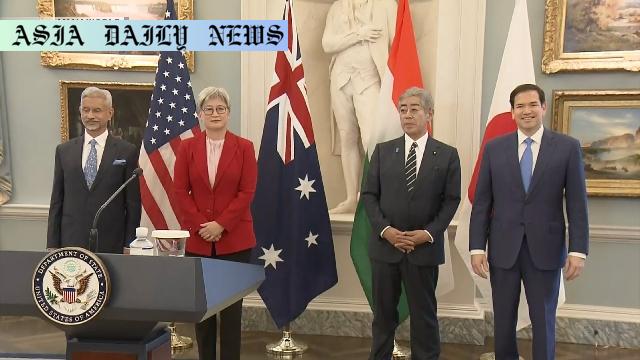QUAD Cooperation: Strengthening Indo-Pacific stability and critical minerals partnership to promote international prosperity.
- QUAD nations agree on cooperative efforts in critical minerals.
- Focus on promoting a free and open Indo-Pacific region.
- Opposition to unilateral actions in East and South China Seas.
- Strengthening economic and geopolitical ties among QUAD powers.

Introduction
The foreign ministers from the QUAD framework—Japan, the United States, Australia, and India—have reaffirmed their commitment to fostering peace and economic stability in the Indo-Pacific region. Meeting in Washington, the leaders discussed pivotal geopolitical and economic challenges, emphasizing the importance of regional collaboration to ensure global growth and prosperity. New commitments, particularly concerning critical minerals development, underscore QUAD’s proactive approach to addressing some of the world’s most pressing issues.
Strengthening the Indo-Pacific Vision
One of the largest takeaways from this meeting was the complete alignment of QUAD nations toward building a free and open Indo-Pacific. Leaders highlighted the Indo-Pacific as a global economic engine and stressed the importance of collective action in maintaining peace and stability in the region. Japanese Foreign Minister Iwaya Takeshi expressed that the prosperity of the international community rests heavily on safeguarding this region, and the QUAD nations, positioned as major powers, are essential drivers of this vision. The ministers also condemned unilateral moves to change the status quo in contentious regions such as the South China Sea and the East China Sea, an implicit reference to challenges posed by China’s growing assertiveness.
Partnership in Critical Minerals
A significant pivot toward economic and strategic collaboration arose with the announcement of joint efforts to develop and produce critical minerals. As the backbone of advancing technology and key industries, these minerals play an increasingly important role in the global supply chain. China has long been a major player in this sector, and by building an alternative supply chain, the QUAD nations aim to reduce dependency and increase strategic autonomy. The cooperation signals a shift in global economic power and diversification of resources critical to technological innovation and defense industries.
Unified Diplomatic Stance
The foreign ministers aimed to present a united front, especially in light of the growing complexities of the global political climate. With face-to-face meetings becoming more frequent, the QUAD partnership highlights its increasing significance. This visible unity sends a strong message to international allies and adversaries alike, showcasing the determination of these nations to maintain geopolitical and economic stability in a rapidly changing world order. The meeting marks the second in a series of robust engagements since US President Donald Trump took office, highlighting an intentional focus on QUAD during his tenure.
The Road Ahead
Moving forward, the initiatives established by the QUAD nations are likely to have far-reaching implications. By nurturing a collaborative framework for critical minerals and downplaying monopolistic supply chains, the four nations position themselves as dynamic drivers of innovation. In addition, their shared commitment to countering unilateral actions and promoting a free and stable Indo-Pacific region is set to create ripple effects far beyond their immediate geographies. The success of these diplomatic engagements will depend heavily on consistent follow-through, pragmatic resource investments, and broad support from regional allies and partners.



Commentary
QUAD’s Role in Strengthening Regional Stability
The recent QUAD meeting demonstrates the increasing relevance of regional alliances in addressing global challenges. By fostering collaboration among nations with shared values and overlapping interests, the QUAD partnership provides an indispensable platform for ensuring peace and economic stability, especially in the Indo-Pacific. The Indo-Pacific, often regarded as a linchpin of the global economy, requires concerted efforts from major players to maintain freedom of navigation, fair trade opportunities, and security in contested waters. The unity and steadfastness of these four countries in countering aggressive unilateral actions make the QUAD’s stance even more critical.
Economic Collaboration in Critical Minerals: A Game Changer
The agreement to enhance cooperation in the production and supply of critical minerals marks a remarkable step forward for the QUAD nations. These minerals are at the heart of some of the most crucial industries, ranging from renewable energy and communications to defense. China’s dominance in this sector has been a longstanding concern, making this multipronged approach to creating alternative supply chains not only strategic but also necessary. A diversified and robust supply of critical materials ensures resilience against potential disruptions, strengthening the economic fortitude of nations worldwide aligned with the QUAD’s vision.
The Growing Influence and Unity of QUAD
This meeting underscores the evolving stature of the QUAD framework. As an embodiment of shared democratic values, economic aspirations, and collective security concerns, the partnership continues to grow in prominence. The repeated emphasis on face-to-face engagements signals an uptick in trust, collaboration, and consensus-building among member states. It is heartening to observe leaders striving toward common goals under a unified banner, creating a pathway that prioritizes equitable growth and stability. The outcome of this partnership sets a new benchmark for regional cooperation, solidifying its importance in a multipolar world.